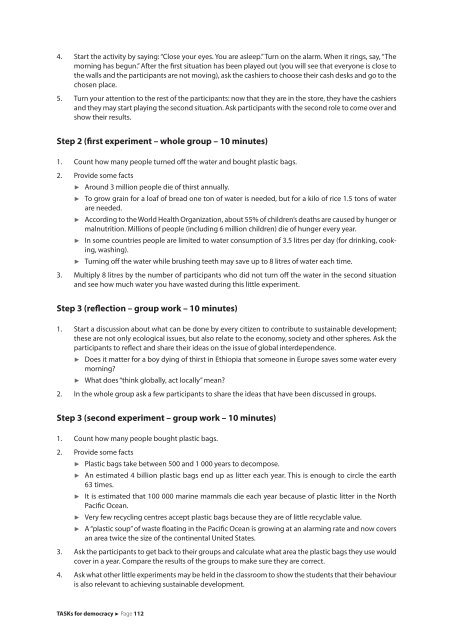TASKs for democracy
4NYw4W
4NYw4W
You also want an ePaper? Increase the reach of your titles
YUMPU automatically turns print PDFs into web optimized ePapers that Google loves.
4. Start the activity by saying: “Close your eyes. You are asleep.” Turn on the alarm. When it rings, say, “The<br />
morning has begun.” After the first situation has been played out (you will see that everyone is close to<br />
the walls and the participants are not moving), ask the cashiers to choose their cash desks and go to the<br />
chosen place.<br />
5. Turn your attention to the rest of the participants: now that they are in the store, they have the cashiers<br />
and they may start playing the second situation. Ask participants with the second role to come over and<br />
show their results.<br />
Step 2 (first experiment – whole group – 10 minutes)<br />
1. Count how many people turned off the water and bought plastic bags.<br />
2. Provide some facts<br />
<br />
<br />
<br />
<br />
Around 3 million people die of thirst annually.<br />
To grow grain <strong>for</strong> a loaf of bread one ton of water is needed, but <strong>for</strong> a kilo of rice 1.5 tons of water<br />
are needed.<br />
According to the World Health Organization, about 55% of children’s deaths are caused by hunger or<br />
malnutrition. Millions of people (including 6 million children) die of hunger every year.<br />
In some countries people are limited to water consumption of 3.5 litres per day (<strong>for</strong> drinking, cooking,<br />
washing).<br />
Turning off the water while brushing teeth may save up to 8 litres of water each time.<br />
3. Multiply 8 litres by the number of participants who did not turn off the water in the second situation<br />
and see how much water you have wasted during this little experiment.<br />
Step 3 (reflection – group work – 10 minutes)<br />
1. Start a discussion about what can be done by every citizen to contribute to sustainable development;<br />
these are not only ecological issues, but also relate to the economy, society and other spheres. Ask the<br />
participants to reflect and share their ideas on the issue of global interdependence.<br />
<br />
Does it matter <strong>for</strong> a boy dying of thirst in Ethiopia that someone in Europe saves some water every<br />
morning?<br />
What does “think globally, act locally” mean?<br />
2. In the whole group ask a few participants to share the ideas that have been discussed in groups.<br />
Step 3 (second experiment – group work – 10 minutes)<br />
1. Count how many people bought plastic bags.<br />
2. Provide some facts<br />
<br />
<br />
<br />
<br />
Plastic bags take between 500 and 1 000 years to decompose.<br />
An estimated 4 billion plastic bags end up as litter each year. This is enough to circle the earth<br />
63 times.<br />
It is estimated that 100 000 marine mammals die each year because of plastic litter in the North<br />
Pacific Ocean.<br />
Very few recycling centres accept plastic bags because they are of little recyclable value.<br />
A “plastic soup” of waste floating in the Pacific Ocean is growing at an alarming rate and now covers<br />
an area twice the size of the continental United States.<br />
3. Ask the participants to get back to their groups and calculate what area the plastic bags they use would<br />
cover in a year. Compare the results of the groups to make sure they are correct.<br />
4. Ask what other little experiments may be held in the classroom to show the students that their behaviour<br />
is also relevant to achieving sustainable development.<br />
<strong>TASKs</strong> <strong>for</strong> <strong>democracy</strong> Page 112


